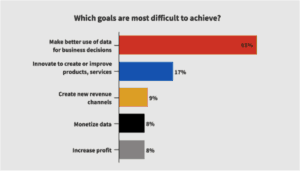
Sanjay Dalwani, vice president, Business Head Retail-CPG-Logistics, North America, Infosys
Brands are making better use of advanced data analytics and automation technologies to improve efficiency, agility and drive growth, with encouraging results. Sporting apparel brand Under Armour, for example, developed an app to monitor customers’ health, fitness and nutrition and offers guidance based on individual data. The esteemed fashion house Estée Lauder has a chatbot on Facebook Messenger that allows customers to check out products, select a delivery option and pay via PayPal without opening another website.
These examples represent important pieces of the groundwork necessary to achieve the next evolution in business: artificial intelligence (AI)-infused commerce, which can fundamentally change how retailers and CPGs reach and interact with customers.
To better understand the state of AI among enterprises across industries, including retail, Infosys commissioned a survey of 1,070 IT and business decision-makers at US companies with revenues of at least $500 million. The survey focused on the specific drivers of digital transformation, the facets and expected outcomes of their digital transformation initiatives, and the role of AI in their transformation journey.
According to the “Human Amplification of the Enterprise” report, 96 percent of respondents agreed that achieving pervasive automation is key to their digital transformation initiatives. Across industries, the tasks organizations are automating concentrate on curating and storing data, garnering enterprise knowledge and insights from data, and managing voluminous and complex documents. Achieving greater employee productivity is the primary motivation to automate these processes, followed closely by reducing costs of manual operations and minimizing human errors.
Overall, 42 percent of the respondents highlighted processes as their main focus when asked to rank the importance of automation in relation to applications, processes, infrastructure and data in their organizations.
Digital transformation in retail
In retail specifically, the automation and AI solutions that grab headlines are often consumer-facing – the sexy customer experience-enabling technologies that wow consumers. This is certainly part of retail’s future, but it’s not the full picture. In fact, it’s a short-sighted view of the deeper and more significant changes already underway.
Zeroing in on the AI technology stack, 75 percent of survey respondents reported that machine learning was a significant part of digital transformation initiatives, followed by cognitive AI-led processes and tasks (57 percent). The study revealed that, among retailers already employing AI, 45 percent are using machine learning technology, a sub-set of AI which enables machines to learn for themselves with access to data and the use of algorithms. Machine learning technology derives insights from massive, structured and unstructured data sets and applies those insights to specific contexts. In retail, these may include dynamic, personalized pricing and promos, chatbots, natural language processing (NLP), dynamic segmentation, targeted marketing and ads, and predictive analytics.
High hopes, daunting challenges
With these technologies deployed, it’s worth exploring how retailers are prioritizing their goals. Again, more than a third of the retailers surveyed indicated that their organization’s main priority was to automate processes. The primary reasons for this are to increase productivity (76 percent), save time (65 percent), minimize manual errors (63 percent), reduce costs (57 percent), and refocus people’s efforts on other non-repetitive tasks that benefit from human intervention (51 percent).
The retail sector can expect to see additional adoption of AI technologies in the next 12 months to support even more ambitious goals, according to the report. Sixty percent said they want AI to provide human-like recommendations for automated customer support/advice, 41 percent were seeking AI that could process complex structured and unstructured data to automate insights-led decisions and 39 percent wanted AI to create a simulated experience to aid the consumer decision-making process.
Despite these aspirations, decision makers in retail recognize that there is much left to be desired: only 8 percent of respondents in the retail sector reported achieving their digital transformation goals. When asked about the challenges of adopting more AI-supported activities as a component of their digital transformation initiative, 61 percent of the retail decision-makers pointed to lack of in-house knowledge and skills around the technology, while 52 percent said there was a lack of financial resources and 47 percent said they lacked a clear implementation plan.

The Infosys Human Amplification in the Enterprise report asked respondents in 10 industries to rank which mandates for growth via digital transformation were most difficult to achieve.
Source: Infosys Ltd.
However, due to factors such as complexity of legacy technology and operations, inadequate focus on automation and lack of alignment between business and IT, automation is slow-going—75 percent of those surveyed said their organization had been unable to automate tasks.
Innovation through productivity
Becoming a more innovative organization requires the flexibility afforded by automation and AI-led processes. Overall, 66 percent of respondents said they needed freedom from performing mundane tasks to be more innovative, while 64 percent said they needed avenues for experimentation and 62 percent said they needed opportunities to learn new skills.
Retailers can take initial steps toward being successful with AI and automation by identifying areas of the business that could potentially be improved with AI technology. Then, by carefully selecting specific business use cases on which to apply AI, retailers can avoid large-scale complexity and evangelize the benefits yielded by the single, smaller implementations. Once proof of concept is achieved, wider adoption can begin. However, various factors play into the success of implementation at scale. Businesses must have a strong data governance strategy, a leadership team dedicated overseeing AI projects, and a focus on cultural change that addresses employee concerns and supports employees with training.
As retailers build a foundation based on automation, they have a responsibility to prepare their employees for a world with more automated processes. In short, businesses should create environments in which automation amplifies its workers rather than replaces them.\
That’s why it’s encouraging that 58 percent of retail and CPG enterprises in the study reported that employee lifelong learning programs were extremely important to their organizations. This goes beyond purely improving productivity to preventing skill loss, retraining people for new high-value roles and fostering creativity and innovation that are essential for ongoing success in the fiercely competitive retail industry. An organization’s competitiveness will be measured in terms of how well its employees are able to do those tasks that automatons cannot do—the tasks that involve human curiosity, creativity and hunger to learn and grow.
Infosys provides information technology consulting and outsourcing services.